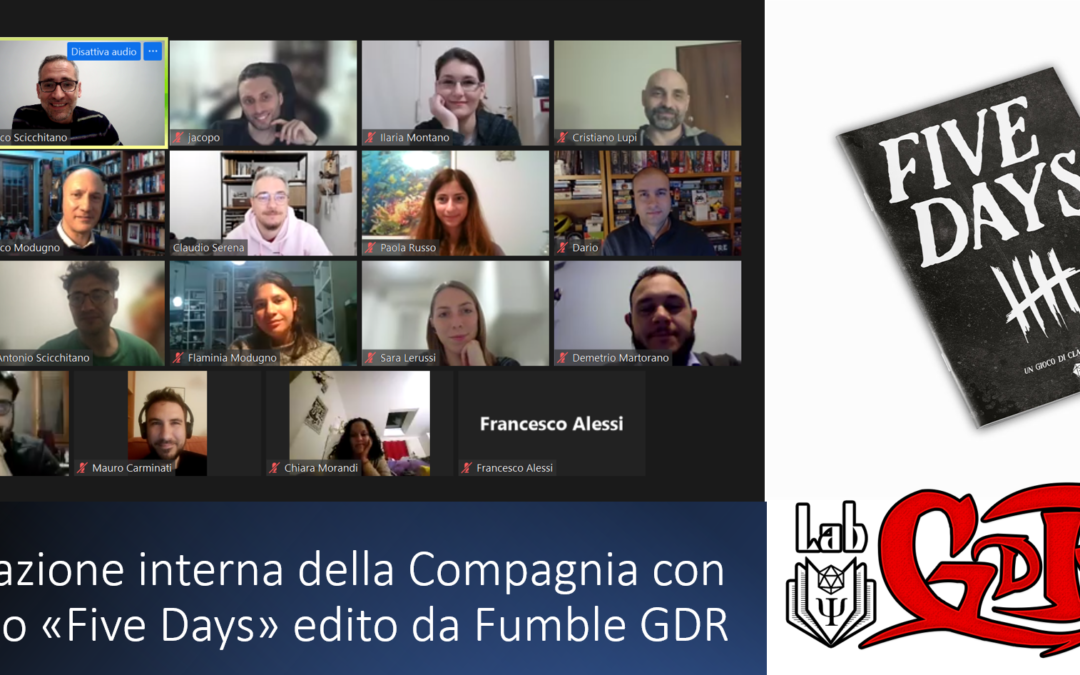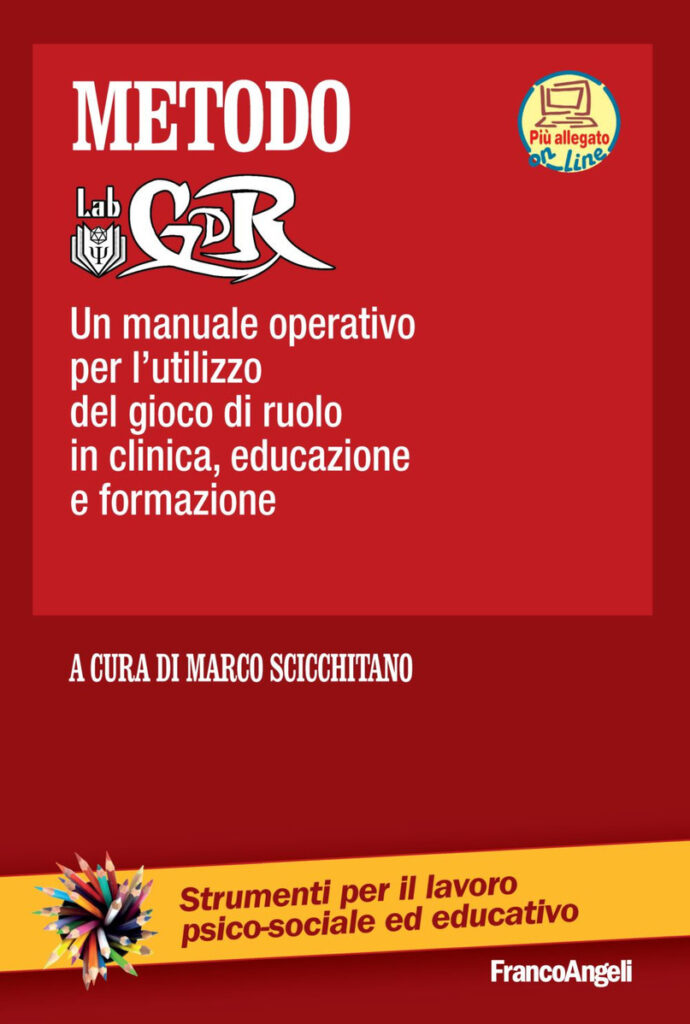The Company of LabGDR operators, gathered once again to grow, have fun and learn together and, this time, with the intention of tackling a topic that we sometimes prefer to escape and evade: grief and suffering.
Hmm… strange! Does a play to enact a painful experience for human beings make sense? And how will it be done? What is the secret to dealing with an experience as painful as grief? And can a game help to understand it?
To answer these questions, we used the role-playing game Five Days, created by Claudio Serena, developed by Fumble RPG and published by MS editions in which players play as characters with a collective unpleasant/traumatic experience. Leading us through the game night were the three facilitators Claudio Serena, Claudio Pustorino and Alice Luidelli who, while not serving as masters (the role not being necessary in the game) but as “senior” players, allowed us to experience the game as novices with the peace of mind of experimenting knowing that there was someone experienced who could inform and participate by helping us move the game forward.
From the preparation of the game, in the days leading up to the session, the theme of grief and the possibility of individually dealing with disturbing experiences was in everyone’s minds strongly catalyzing. After reading the warnings in the game guide, a fellow psychotherapist preferred not to play the game so as not to have to deal with issues she preferred to avoid at that time. Knowing how to put boundaries and decide what emotional content to give access to, after all, is a healthy personal skill.
Yet, the experience we had of the game made us change our attitude and consideration of the game, greatly relativizing the individual dynamic of exposure to disturbing content.
The game, starting from the name and arriving at the structuring of the phases that determine the dynamics of the game is a direct reference to the phases of mourning of Kubler Ross’s model popularized in Italy through the 1969 book “Death and Dying.” According to the model, the human mind in order to cope with the distressing experiences of loss goes through an elaborative process distinguishable in 5 stages characterized by: denial, anger, negotiation, depression and acceptance.
The model has had great resonance and diffusion, due to its schematic and representability, however, we know that these stages are not necessarily rigid and universal for every person and situation. People may experience these emotions in different ways and at different times, and not everyone goes through all five stages. More recent studies and clinical practice (see, e.g., Onofri and La Rosa’s “Mourning” from 2015) have taken more specific approaches on individual experiences, moving away from explaining consequential processual stages and focusing on trauma experience and individual dissociative processing.
The Kübler-Ross model has often been applied to people coping with their own death or the death of a loved one, but it can also be used to describe how people cope with other significant losses, such as the end of a relationship or a major life transition. This nuance is fully captured by the game, in which all the playing characters have a common experience the incident, with which they will have to deal more or less directly depending on the players’ choices and slowly tending to a shared narrative construction of the fact. Also central is the role of the Family or group to which they belong, in fact, all the players on stage are members of the same family or group that has experienced a disturbing experience of which they have all suffered emotional reverberations and which during the turns of the game will have to be progressively played out.
The game has a rhythm marked in 5 phases (corresponding to the stages of grief acceptance according to the KR model) with the possibility of freely switching from one phase to another. It might be confusing for a first-time player but, nevertheless we found very interesting the dynamic whereby each player becomes the protagonist of one of the phases chosen independently leading to homogeneous involvement within the table group. Every other player, in fact will be able to participate in the phase as it was initiated by the player on duty, either because it was directly involved by him or on his own initiative, driven by the dynamics of the game to tune in to the experience of the player on duty. During the staging of the phase, the player must choose and interpret the answer to a question posed by the game creators themselves. The questions posed at each stage to the player force participants to question different dynamics present during and after a conflict by nurturing each individual’s metacognitive process.
This is further fueled by the dynamics associated with answering such questions: the player being asked the question responds aloud, justifying both his or her past choices and present choices allowing all players ananalysis of the player’sactions in the immediate and a cascading series of reactions in later stages. Continually having players question their own feelings and the feelings of other players leads the player to continually place himself on the “other side of the fence” by identifying with or analyzing the other’s actions. Participants are also led to question their own of actions and the consequences they had on themselves and others.
The emotional component related to the 5 stages of grief, the focus and driving force of the game, also has potential for the stage diagnostics of a patient and can help to frame the case by refining the representation of metacognitive functioning: it is possible, in fact, to discuss at the end of the session the choices made and the experiences felt through a Meta2 moment, just as at the Meta1 level the majority choice of a particular stage of grief, combined with questions and in conjunction with the characterization and reactions of the simulated self during the scenes, can be factors in the analysis of the emotional state and cognitive elaborative processes that the experienced clinician can observe and return in appropriate ways to the player.
The Token system , which makes up the lintel of the gears that move the game forward, is well structured, pushes for judicious use of one’s initiative, and is an excellent tool for participating within scenes and actively interacting with other protagonists. It has the potential risk of facilitating interaction among more extroverted, resourceful, and particularly active players, while excluding those who more reticently expose themselves in interaction.
Five Days is a very versatile game that can be used using the LabGDR method to pursue goals by stimulating participants in mutual interactions and the use of metacognitive skills. The game has the potential to be a therapeutic tool with regard to conflict families, unpleasant experiences and interpersonal conflicts with greater incidence in cases marked by dysfunctional communication and resentment. Everyone has had in his or her experience conflicts that have led to the rupture of very important relationships and ties, and it is not easy within that conflict to maintain a balanced position, to try to understand the experience of the other by decentering from one’s own. Often over the years factors such as communication inabilities, negative feelings now permeated in the individual, empathic deficiency, conflicts of interests and emotional blindness only fuel the conflict. The game has the structural potential to activate the metacognitive skills of decentering, differentiation and mastery by giving the player the opportunity to observe himself, his actions and choices and on the other hand indirectly guide him toward understanding the actions and choices of others. Another very stimulating element of the game is its convergent narrative tension, like a perspective point of synthesis toward which the cues that players invent and contribute move and harmonize. And that point is not decided by the master, it is not prefixed by the game but is a shared narrative in which all the players participate by layering it over time and in different points of view. The narrative recomposition of a traumatic experience is often an extremely important factor in its resolution precisely because of the defragmenting dissociation that intense grief provides.
We recommend it for workshops with adolescents and adults in which the facilitator’s role must be geared both toward stimulating play but also toward vigilant attention to the themes that may emerge, the ways in which they are treated so as not to allow for excessive emotional disruption.
And so is there or is there not this secret to being able to deal with the suffering that every bond brings when it cracks or breaks? There is a way to deal with it but it is not a secret and sometimes we forget that and the Five Days role-play reminds us: it is to deal with it together.
By The Company of LabGDR Operators


